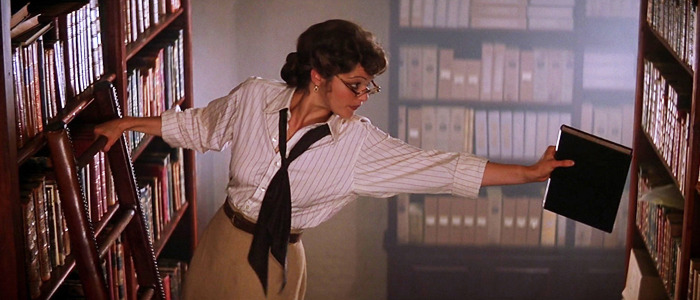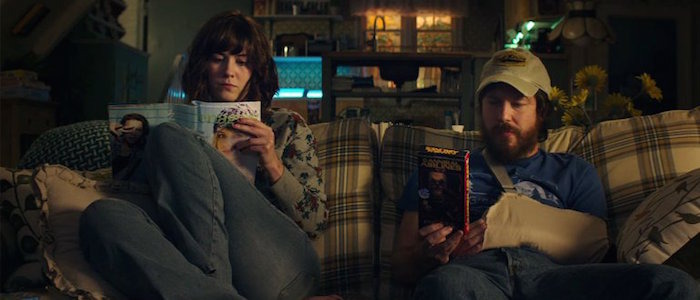If You Thought Our Culture Had Already Reached Peak Nostalgia, The Coronavirus May Take It To A Whole New Level
Nostalgia has been the dominant force in filmed entertainment for the entire 21st century. Superhero blockbusters brought childhood comic book reading sessions to life, a slew of remakes have repackaged animation into live-action for a new generation, and the rise of streaming has seen multiple services revive long-cancelled television titles in an attempt to cash in on viewers' fond memories (while bolstering the services' media libraries at the same time). Nostalgia has had an outsized influence on the media Hollywood produces, and thanks to the coronavirus, its reign seems poised to continue...and maybe even grow more powerful than ever.
An Academic Approach
In a 2012 essay at Culture Unbound: Journal of Current Cultural Research, author Elena Oliete-Aldea looks back at the 2008/2009 economic crisis and argues that the interconnectedness of modern society in this century has brought about significant changes in the status quo, causing people to turn to nostalgia as a coping mechanism. "With not only an uncertain future, but an unstable present, 21st century societies affected by the economic crisis tend to look back nostalgically to the past," she says, delivering a partial explanation for why nostalgia-tinged culture has reigned supreme over the past decade. Andrew Abeyta, a researcher at Rutgers University, calls nostalgia "a potent reminder of what makes our lives meaningful", and says reflecting on meaningful relationships and experiences can help people cope in troubled times.
In the midst of a global pandemic, it's not surprising that people would nostalgically turn to familiar entertainment to ease the burden of living through this era. Through no fault of its own, Disney+, which has hit 50 million paying subscribers globally since launching a month before COVID-19 took hold, seems perfectly positioned to benefit from this crisis, both in terms of content and price. (It's the cheapest major ad-free streaming service.) Disney has been in the nostalgia business for years – just click through this site's archives for all the proof you'd ever need – and as they've gobbled up assets and rivals, they've become the most powerful player in Hollywood.
A Possible Future for Theaters
When the dust settles and society returns to normal, do you think the economic losses Disney suffered during this period will make them more or less willing to take creative risks moving forward? Challenging, interesting, non-blockbuster films already faced a tough path to success before the coronavirus completely reshaped the industry as we know it. If only the biggest players survive this crisis, those smaller movies may not even be able to amass a metaphorical army, let alone be able to fight an uphill battle. Though the government stimulus package may help theaters survive, the theater industry was already in decline. Even in a best-case scenario, the outcome doesn't look great for theaters right now: with traditional distribution windows finally being shattered by major studios and viewing habits being shaped in real time as everyone works from home, it's a very real possibility that we may soon witness the dying gasp of movie theaters as we know them.
Last November, the Department of Justice filed a motion to terminate the Paramount consent decrees, a series of legal guidelines which, among other things, essentially forced the studios to divest their ownership of movie theater chains. If those decrees are overturned, it could be open season for studios to swoop in and potentially purchase any major theater chains that may be struggling in the wake of COVID-19. If that becomes a widespread tactic, it's not difficult to envision a situation in which Disney, Netflix, Warner Bros., etc. become the most prominent theater owners in the country – and if the studios own the theaters, it seems unlikely that they would program films from the independent cinema community out of the goodness of their hearts.
Of course, that's assuming that theatrically-released movies retain their status as major pop culture milestones when this all ends. Customer behavior patterns are currently shifting in favor of streaming, and the studios' decision to release theatrical movies on demand quickly in the face of the pandemic could end up becoming closer to the new status quo when society begins to rebuild. I'm convinced theaters will always be around in some form for those who want to use them, but the very idea of big-screen entertainment is facing an uncertain future, and with the upcoming launch of services like HBO Max and Peacock, there's a chance theaters themselves become an endangered species – regardless of who's running them.
Forced Nostalgia in Quarantine
So far, I've mostly been addressing the coronavirus and its affect on nostalgia in predictive terms. But in a more concrete way, the pandemic is already affecting the way we consume entertainment. Several major movies (No Time to Die, Black Widow, Wonder Woman 1984, the list goes on) have shifted their release dates, while theaters remain closed. With fewer new releases, we're essentially forced to seek out older content by default. Admittedly, that doesn't always result in turning to familiar titles from childhood or from days affectionately remembered – some people could be using this time to watch older movies or shows they've never seen before. But with the news cycle as dire as it is, plenty of folks could use a coping mechanism, and nostalgia is proving to be an effective option. As this period of world history stretches on and the economic and social impacts continue to grow, will nostalgia's bolstered position atop the pop culture mountain ever be challenged? Or are we on the precipice of an era in which fondness for the familiar becomes so deep in the way decisions are made in Hollywood that it elbows out anything that doesn't fit the mold?
In 2018, I spoke with Steven Spielberg during a press junket for his (nostalgia-heavy) movie Ready Player One. "I have the most intimate relationship with nostalgia," the director told me. "I basically live in nostalgia...I'm living that way most of my life." As if to underline his point, Spielberg decided soon after that his next movie would be a remake of the classic 1961 musical West Side Story, a project the filmmaker has been thinking about for decades. (His new version is currently slated to hit theaters this December.)
Spielberg's comment came long before COVID-19, but it's emblematic of nostalgia's power. If even the biggest filmmaker in the world is not immune, will Hollywood as a whole be able to withstand its allure?



